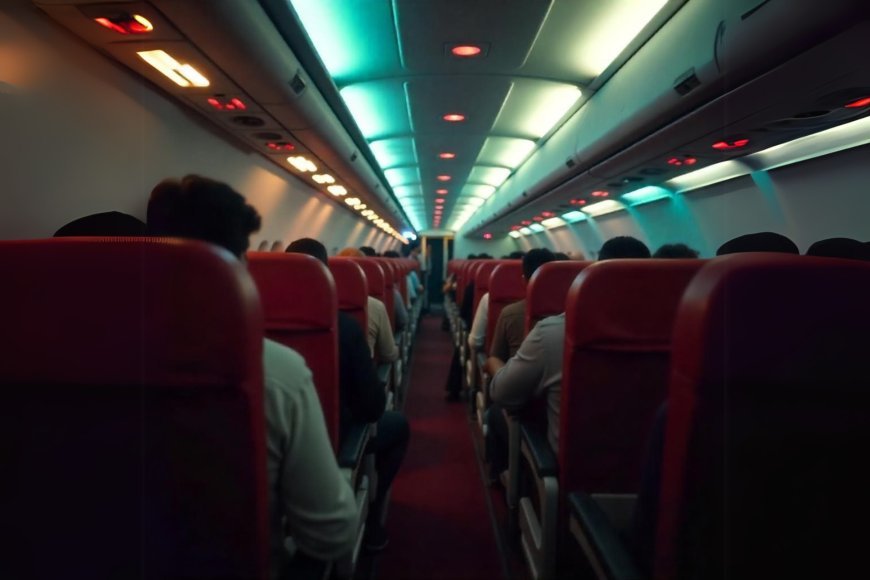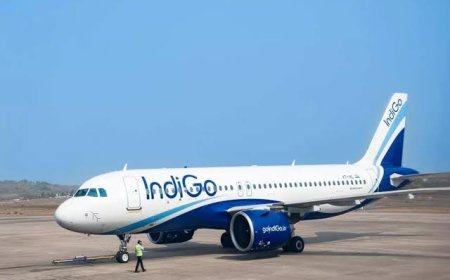AC Malfunction on Delhi to Bhubaneswar Air India Flight Triggers Passenger Discomfort; Shocking Footage Goes Viral
Shocking scene inside an Air India flight as passengers suffer in sweltering heat due to AC failure. Distress, arguments, and viral chaos captured mid-air.

In an alarming situation that has drawn significant attention, an Air India Express flight en route from Delhi to Bhubaneswar suffered a major air conditioning malfunction during the journey, leading to extreme discomfort among travelers. The issue, which unfolded on May 11, 2025, has not only gone viral due to harrowing visuals but also raised significant questions about passenger safety and airline accountability.
A Routine Flight Turns Chaotic

What was expected to be a regular journey on Air India Express Flight IX-1128 soon turned into a nightmare for the 180 passengers on board. Shortly after takeoff, the aircraft's air conditioning system failed, causing cabin temperatures to rise to unbearable levels. The crew reportedly attempted to manage the situation, but the heat continued to build, leading to scenes of chaos and visible distress among the passengers.
Some passengers were seen fanning themselves with whatever they could find, while others removed upper layers of clothing to cope with the intense heat. Several individuals, including elderly and children, reportedly felt faint due to the stifling conditions. As the visuals of suffering travelers circulated, many were shocked by the scenes, questioning how such a lapse could occur on a reputed airline like Air India Express.
Eyewitness Accounts Go Viral
One of the passengers, Tusharkant Rout, a Gurugram-based professional, shared a firsthand account of the ordeal on LinkedIn. Accompanied by photos showing clearly agitated and perspiring passengers, his post quickly went viral. He described the situation as "serious and critical," noting that a fellow passenger’s health had deteriorated as a result of the extreme heat.
Rout’s post sparked a wave of reactions across social media, with users expressing outrage and calling for better safety protocols and customer care practices by Indian airlines. Videos and images from inside the cabin began circulating across various platforms, further amplifying public outcry. The incident has become a flashpoint for criticism of how Indian aviation treats customer safety.
Airline Responds
In response to the broad dissemination of the event, Air India Express issued a statement presenting their viewpoint. According to the airline, cabin air conditioning can sometimes feel ineffective during boarding and taxiing phases when aircraft doors are open and the Auxiliary Power Unit (APU) is not fully operational. They claimed that the issue is generally resolved after takeoff when the air system becomes functional.
Despite their clarification, passengers insisted that the discomfort lasted throughout much of the journey, suggesting that the problem persisted beyond takeoff. Several flyers questioned why the airline allowed the aircraft to depart with a known issue or without confirming the functionality of essential systems. Such technical failures raise deeper concerns about operational checks and maintenance culture within airline organizations.
A Pattern of Negligence?
This event has once again sparked worries about the quality of Air India’s aircraft upkeep and onboard service standards. Notably, a similar situation was reported just days earlier on a Pune to Jaipur flight where passengers faced extreme temperatures due to another AC failure.
Repeated failures of this nature suggest systemic issues that go beyond one-off technical glitches. Experts argue that preventive maintenance and thorough system checks should be routine, especially in regions with hot climates like India, where malfunctioning air conditioning can pose serious health risks. Passengers expect comfort and reliability when they choose a trusted airline, not distress and discomfort.
Impact on Passengers
The most immediate effect of the AC malfunction was passenger discomfort Yet, the lasting consequences might prove to be even more profound. Several passengers stated they would reconsider flying with Air India Express again, citing concerns over safety and customer service. Travel bloggers and influencers have picked up the incident, warning their followers about potential risks when flying certain domestic carriers.
Moreover, this incident raises important questions about the preparedness of airline staff to handle such emergencies. Was medical assistance readily available? Did any measures exist to support at-risk travelers, like seniors or individuals with health concerns? Emergency preparedness is a crucial aspect of airline operations, especially on flights experiencing sudden equipment malfunctions.
Public and Regulatory Response
Following the viral spread of footage and complaints, consumer rights groups and aviation watchdogs have begun to take notice. Calls for a formal inquiry have been growing, with many demanding penalties for negligence and stronger regulations for in-flight safety standards.
The Civil Aviation Authority (DGCA) is anticipated to assess the situation. If the investigation finds lapses in maintenance or protocol, Air India Express could face fines or operational restrictions. The DGCA’s action on this case may set a precedent for future aviation safety regulation and enforcement in India.
Comparisons with Global Airlines
In global aviation markets, such incidents are treated with the utmost seriousness. Airlines are held accountable not only through regulatory oversight but also in the court of public opinion. In comparison, India's aviation industry has often faced criticism for lapses in customer service and operational transparency.
Airlines in regions with similar climatic conditions invest heavily in maintaining effective cooling systems, knowing well that a lack of air circulation can lead to medical emergencies. Air India Express must benchmark its practices with global carriers if it seeks to remain competitive and reliable.
Passenger Rights and Expectations
The episode has also sparked discussions on passenger rights. Are Indian passengers adequately protected in the event of such failures? Unlike the European Union or the United States, India lacks robust enforcement of compensation or refund mechanisms for such service lapses.
Consumer advocates are urging the government and airlines to implement stronger rights frameworks. These would ensure that passengers subjected to discomfort or danger receive appropriate remedies—be it monetary compensation or enhanced customer grievance mechanisms.
Moving Forward
While the airline has yet to announce concrete measures in response to this incident, experts recommend immediate steps to restore public trust. These could include:
· Comprehensive maintenance audits of all aircraft
· Mandatory pre-flight checks of air conditioning and safety systems
· Advanced team preparedness for handling mid-air crisis situations
· Real-time communication with passengers during flight disruptions
· Installation of redundant cooling systems for high-temperature operations
Improving transparency and responsiveness will be critical for Air India Express if it hopes to regain customer confidence. Passengers today are vocal, informed, and connected—any misstep can lead to rapid public backlash.
Final Thoughts
The uncomfortable and potentially hazardous experience of passengers on Air India Express Flight IX-1128 serves as a stark reminder of the importance of operational integrity and passenger care in the aviation industry. With increasing competition in India's skies, airlines cannot afford to overlook basic in-flight amenities and safety protocols.
Incidents like this one not only tarnish an airline’s reputation but also shake the confidence of flyers who entrust their lives and comfort to these carriers. The airline industry must ensure that such oversights do not repeat, and regulatory bodies must hold operators accountable.
Passengers expect more than just a flight—they expect care, accountability, and safety. The government, airlines, and aviation authorities must work collaboratively to raise the bar for air travel standards in India.
For detailed updates and coverage on this incident and other breaking stories, visit news12odisha.com.
In conclusion, the aviation industry must take immediate steps to address such lapses and prioritize the comfort and safety of passengers, especially in light of incidents like this where the AC Malfunction on Delhi to Bhubaneswar Air India Flight Triggers Passenger Discomfort; Shocking Footage Goes Viral.
What's Your Reaction?





















































